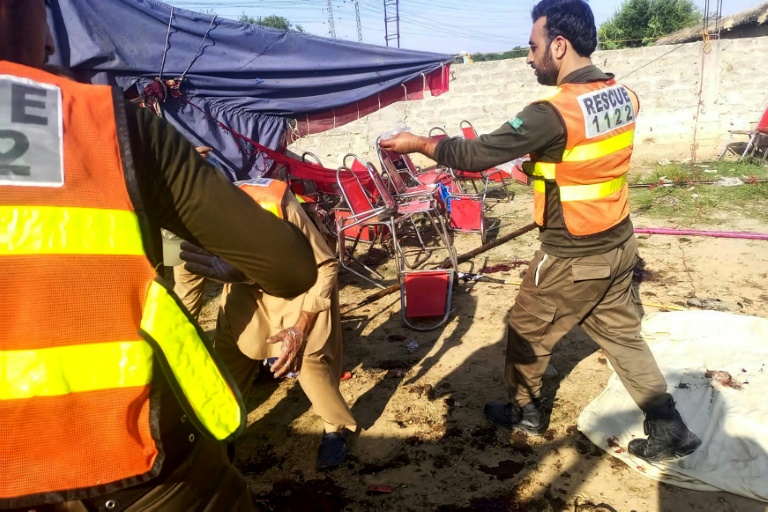AFP
At least 39 people were killed and dozens more wounded Sunday in a suicide bombing at a political gathering of a leading Islamic party in northwest Pakistan, officials said.
The blast targeted the Jamiat Ulema-e-Islam-F (JUI-F) party, a government coalition partner led by an influential firebrand cleric.
More than 400 party members and supporters had gathered under a canopy when the attack took place in the town of Khar, near the border with Afghanistan.
“As we awaited the arrival of the central leadership, a sudden and loud bang echoed through the venue,” said Sabeeh Ullah, a 24-year-old supporter who fractured his arm in the blast.
“I found myself lying next to someone who had lost their limbs. The air was filled with the smell of human flesh,” he told AFP by phone.
Riaz Anwar, the health minister for Khyber Pakhtunkhwa province, said local hospitals reported 39 dead and 123 wounded, including 17 patients in serious condition.
“It was a suicide attack, with the bomber detonating himself in close proximity to the stage,” he told AFP.
Provincial governor Haji Ghulam Ali confirmed the toll.
Images from the blast site circulating on social media showed bodies strewn around the scene, and volunteers helping blood-soaked victims to ambulances.
Pakistan’s national assembly is due to dissolve in the next few weeks ahead of elections expected in October or November, and political parties are already preparing to campaign.
The blast coincides with a visit by a senior delegation of Chinese officials, including Vice Premier He Lifeng, who are due to arrive in the capital later Sunday evening.
No group has claimed responsibility for the attack, but the local chapter of the Islamic State (IS) group has recently carried out attacks against JUI-F.
Last year, IS said it was behind violent attacks against religious scholars affiliated with the party, which has a huge network of mosques and madrassas in the north and west of the country.
The jihadist group accuses JUI-F of hypocrisy for being an Islamic group while supporting hostile governments and the military.
The party’s leader, cleric Fazlur Rehman started political life as a firebrand Islamist hardliner but has softened his public image over the years in a bid to forge alliances with secular parties on the left and right of the spectrum.
With the ability to mobilise tens of thousands of madrassa students, his party never musters enough support for power on its own, but is usually a key player in any coalition.
Pakistan has seen a sharp rise in militant attacks since the Afghan Taliban surged back to power in neighbouring Afghanistan in 2021.
Pakistan’s home-grown Taliban group, Tehreek-e-Taliban Pakistan (TTP), has largely directed its campaign against security officials, including police officers.
In January, a suicide bomber linked to Pakistan’s Taliban blew himself up in a mosque inside a police compound in the northwestern city of Peshawar, killing more than 80 officers.
The militant assaults have been focused in regions abutting Afghanistan, and Islamabad alleges some are being planned on Afghan soil — a charge Kabul denies.
Pakistan was once plagued by almost daily bombings, but a major military clearance operation in the former tribal areas starting in 2014 largely restored order.
The seven remote districts that border Afghanistan, of which Bajaur is one, were later brought under the control of Pakistani authorities after the passage of legislation in 2018.
Analysts say militants in the former tribal areas have become emboldened since the return of the Afghan Taliban.
Afghan government spokesman Zabihullah Mujahid condemned the attack in a statement, adding Kabul “shares its deepest condolences to the affected families”.







